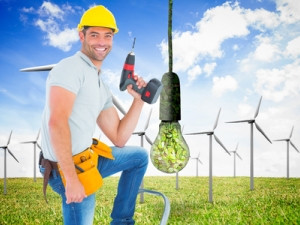
SA had the world's fastest growing green economy in 2015, according to a recent Moody's report.
The report says while local banks and development finance institutions have played a dominant role in financing SA's renewable energy projects, Moody's expects increasing participation of institutional investors in the sector.
"The South African renewable energy market has grown rapidly over the last five years or so and there is rising demand for renewables debt. South Africa was the continent's largest renewables market in 2015 in terms of asset finance for utility-scale projects, and it saw the highest year-on-year growth globally," says Christopher Bredholt, a Moody's VP and senior analyst.
SA's debt market for renewable energy projects is supported by several credit positive developments, including a significant fall in renewable electricity costs, the growth of independent renewable power producers and the likely increased participation of institutional investors, Moody's says.
Although coal still provides around three-quarters of SA's energy, the ratings agency says government aims to increase the country's renewable capacity to around 17.8 gigawatts by 2030, compared to 1.9 gigawatts in June 2015.
The development of SA's renewables sector will be shaped by the country's transmission infrastructure, which needs additional capacity, as well as the broader sovereign credit environment, it adds.
The growth of SA's green economy comes amid uncertainties regarding the future of local independent power producers (IPPs) in the country. This is after power utility Eskom wrote a letter to the Department of Energy asking for clarity or a dialogue regarding the next contracting phase of IPPs beyond bid window 4.5.
Eskom has also been accused of delaying the signing of contracts with IPPs, thereby directly affecting the viability of projects in an advanced stage of development.
Despite these setbacks, the South African Wind Energy Association (SAWEA) says the industry is confident in its future.
In another positive move last week, president Jacob Zuma clarified the government's position on the IPP programme, insisting nothing has changed with its policy.
In a statement, the presidency said: "President Jacob Zuma has taken note of the concerns raised in the public domain about confusion or doubt that may have been created about the Renewable Energy Independent Power Producers Programme of government.
"The Presidency wishes to clarify that all the independent power producer programmes, namely renewable energy, coal and gas and any other determinations made by the Minister of Energy, are and remain government policy and are supported by the Presidency.
"Recent public statements which may have cast doubt on government's commitment to the IPP programme are not government policy and do not reflect the position of government on the matter of renewable energy."
Zuma said government remains fully behind the IPP programme, and the confusing signals caused by the unfortunate public utterances are regretted.
"As Moody's shows, we have the fastest growing green economy in the world," says Johan van den Berg, CEO of SAWEA.
"We've built a R7 billion infrastructure sector in four years, all with private money, creating many jobs and significant new manufacturing capability, while quickly increasing local content beyond 45%."
Van den Berg explains the renewables industry is responsible for approximately 30% of all foreign direct investment into the country.
"Additionally, the cost of wind power has steadily lowered to approximately 40% below the cost of new coal power at Medupi," he adds.
Share